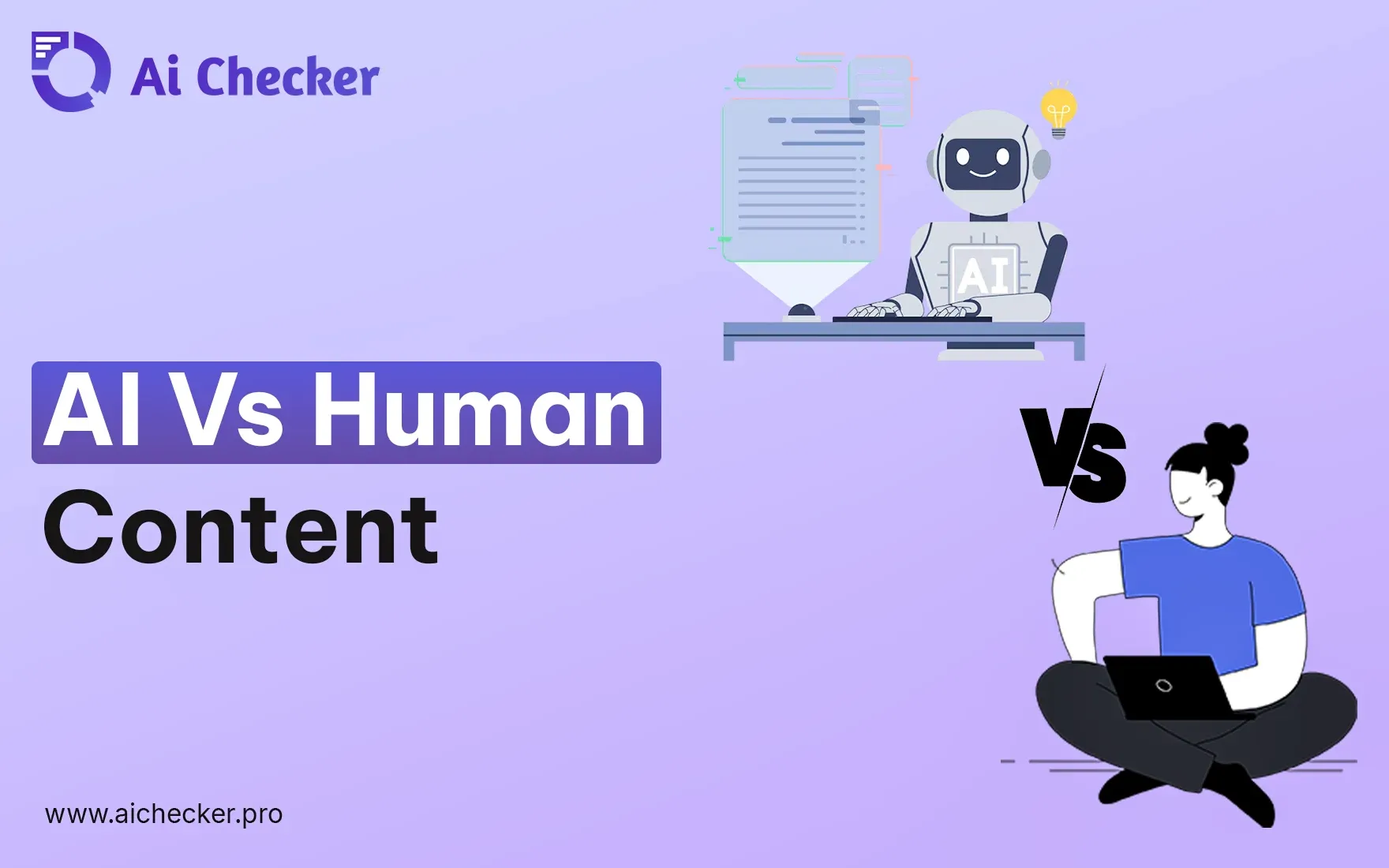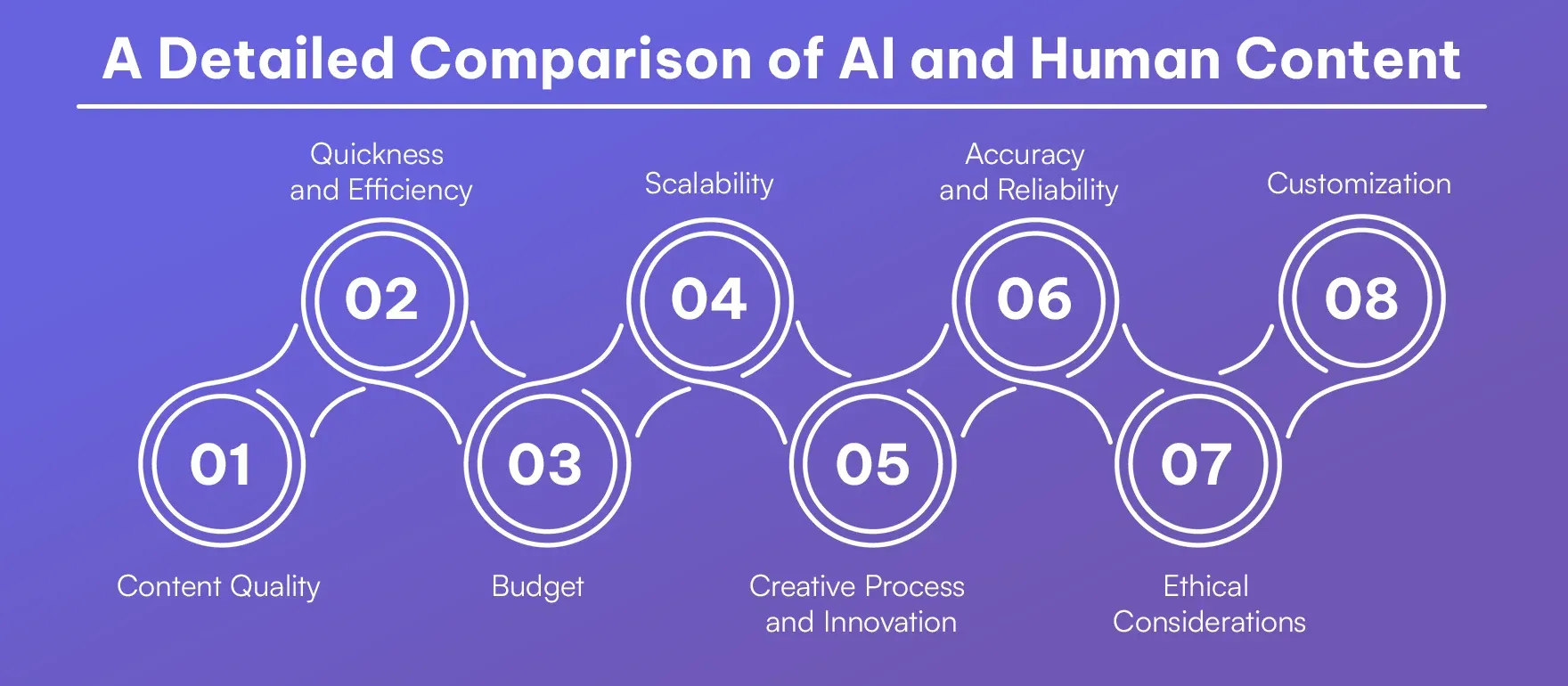Sign In
Welcome to AI Checker Sign in to continue your exploration of our platform with all its exciting features.
Forgot Password?
Don’t have an account ? Sign Up
Forgot Password
We'll Send You An Email To Reset Your Password.
Back to Login
Sign Up
Embrace the Future with AI Checker Sign up now and let's rewrite the possibilities together.
Already have an account? Sign In
Enter OTP
We'll send you an email to reset your password.
Back to Login
Enter OTP
We'll send you an OTP on your registered email address.
Back to Login
Confirm Password
Please enter your new password.
AI vs. Human Content: What's Better for SEO?
 Nathan Porter
Nathan Porter
TABLE OF CONTENTS
Quick Summary
What is AI Content?
Human Written Content: What Is It?
A Detailed Comparison of AI and Human Content
Is it Possible for Google to Detect AI Content?
Is it Possible to Rank Well on Google with AI Content?
Benefits of AI-written Content for SEO
Disadvantages of AI-written Content for SEO
AI vs. Human Content: A Comparative Analysis
Conclusion
FAQ's
Let's cut to the chase: the AI versus human content debate has become the digital marketing world's favorite soap opera. Plot twist - both characters might end up being the heroes of your SEO story.
Quick Summary
Think of AI as your super-efficient intern who never sleeps, while human writers are your creative directors who understand the subtle art of making readers snort-laugh at their screens. Which one wins the SEO crown? Spoiler alert: it's complicated.
What is AI Content?
Just think of that friend who always knows how you will finish your sentence. The same is AI content, but it has been trained by billions of paragraphs and can predict what follows. It's the tech world's response to the writer's block, which produces the content so much faster that you can't even pronounce the word "algorithm."
Human Written Content: What Is It?
Ah, good old-fashioned human writing – where coffee-fueled creativity meets keyboard strokes. It's the art of turning thoughts into words, complete with those delightful typos we eventually catch (hopefully). Think Shakespeare with a MacBook.
A Detailed Comparison of AI and Human Content
AI excels in speed, scalability, and cost-efficiency, delivering data-driven content. Humans bring emotional depth, personal touch, and ethical intuition, excelling in creativity and nuance. Together, they complement each other for balanced and impactful content creation.

1. Content Quality
AI : "The product enhances user experience through optimized functionality."
Human : "This gadget makes your life easier - trust me, I've dropped it in my coffee three times and it still works."
The difference? Soul. Humans inject personal experience and emotion that AI still struggles to replicate authentically.
2. Quickness and Efficiency
AI : "Content generation completed in 2.5 minutes."
Human: "Finally finished this piece after my third coffee and a heated debate with my cat."
AI wins the speed race, but humans bring the kind of procrastination-induced brilliance that sometimes leads to genius.
3. Budget
AI: "Cost-effective content solution with scalable pricing."
Human: "Worth every penny because I actually know what your customers complain about on Twitter."
AI might be cheaper per word, but humans invest emotional capital that money can't buy.
4. Scalability
AI: "Generate unlimited content variations instantaneously."
Human: "Give me a minute to crack my knuckles and refill my coffee."
AI scales like a champion, while humans need things like "sleep" and "weekends."
5. Creative Process and Innovation
AI: "Implementing creative algorithms based on existing patterns."
Human: "Had this brilliant idea while shampooing my hair."
Humans still corner the market on those random shower thoughts that turn into viral content.
6. Accuracy and Reliability
AI: "Data-driven content based on programmed parameters."
Human: "I double-checked this because my reputation's on the line."
AI excels at facts but might miss nuance; humans catch subtleties but might occasionally misremember statistics.
7. Ethical Considerations
AI: "Content generated within defined ethical parameters."
Human: "I wouldn't write this because it doesn't feel right."
Humans bring moral compass 1.0; AI runs on ethical guidelines 2.0 beta.
8. Customization
AI: "Tailoring content based on demographic data points."
Human: "I wrote this thinking about Karen from accounting who always has these questions."
Humans understand context at a deeper level, while AI masters pattern recognition.
Is it Possible for Google to Detect AI Content?
Google's getting pretty smart about detecting AI content, nowadays. While it doesn't explicitly penalize AI content, it rewards content that shows expertise, authority, and trustworthiness (E-A-T).
Is it Possible to Rank Well on Google with AI Content?
Yes, but like a good recipe, it needs human seasoning. Pure AI content might rank initially, but sustained SEO success usually requires human editing and insight. Think of it as AI providing the canvas, humans adding the artistic touches.
Benefits of AI-written Content for SEO
When it comes to SEO perks, AI content is like that overachieving coworker who never sleeps. Its production speed would make Olympic sprinters jealous, churning out articles faster than you can say "content strategy." The output maintains a consistent quality that would make Swiss watchmakers proud, while its keyword optimization is so precise it could thread a digital needle. Budget-conscious marketers, rejoice – AI scales content production without scaling your coffee budget. Plus, unlike your human writers who need trivial things like "sleep" and "weekends," AI cheerfully churns out content 24/7 like an energizer bunny on espresso. And let's talk about grammar – while it occasionally trips over the more exotic English language rules, AI generally delivers squeaky-clean copy that would make your old English teacher beam with pride (most of the time, anyway).
Disadvantages of AI-written Content for SEO
Think of AI as that brilliant exchange student who memorized the dictionary but still doesn't get why we don't literally "break a leg" for good luck. While it can write endlessly, its emotional range rivals that of a pet rock, often churning out content with all the personality of a customer service script. Accuracy? Well, AI occasionally plays fast and loose with facts like a politician during election season. When it comes to original insights, AI is more of a remix artist than a revolutionary thinker – great at reorganizing existing ideas, but don't expect any groundbreaking revelations. The real kicker is its disconnect from real-world context; it's like having a writer who's never left their room trying to describe Times Square on New Year's Eve. And despite our best efforts, AI content sometimes still sounds like what you'd get if you taught a calculator to write poetry – technically correct, but missing that human spark that makes readers actually care.
AI vs. Human Content: A Comparative Analysis
| No | Aspect | AI Content | Human Content |
|---|---|---|---|
| 1 | Core Strength | Systematic and data-driven approach, like a digital librarian who never sleeps | Intuitive and experience-based insights, shaped by coffee breaks and life lessons |
| 2 | Problem-Solving | Follows patterns like a diligent student with perfect memory | Thinks laterally, often having "aha" moments in the shower |
| 3 | Voice & Tone | As consistent as a metronome, but about as exciting as one too | Varies like weather in April - unpredictable but authentic |
| 4 | Research Depth | Knows a little about everything, masters of none | Deep dives into specific topics with personal interest and expertise |
| 5 | Real-world Context | Limited to what it's read, never tasted spicy food | Brings real experiences, including that one embarrassing moment from 2015 |
| 6 | Error Handling | Misses obvious jokes but catches every grammar slip | Might miss a comma but catches cultural faux pas |
| 7 | Target Audience | Speaks to everyone like a GPS - technically correct but impersonal | Connects like that friend who knows exactly what you need to hear |
| 8 | Innovation | Remixes old hits into new medleys | Composes original symphonies (sometimes while doing dishes) |
| 9 | Cultural Nuance | Processes culture like a tourist reading guidebooks | Navigates cultural contexts like a local showing you their favorite spots |
| 10 | Content Updates | Updates faster than your smartphone's OS, but needs human QA | Takes time to revise but includes last week's trending memes naturally |
Conclusion
The future of SEO isn't about AI vs. human content – it's about AI plus human content. Like peanut butter and jelly, they're better together. Smart marketers are already using AI to handle the heavy lifting while letting humans add that special sauce that turns content from "meh" to "magnificent." Tools like AIchecker Pro’s ai to human text converter tool are valuable in refining AI content to align with SEO standards and enhance performance.
FAQ's
1. How does ai vs human writing impact SEO performance?
AI writing provides consistent keyword optimization and quick scaling, while human writing offers authentic engagement and natural language flow. The best SEO results often come from combining both approaches, letting each strengthen the other's weaknesses.
2. Can AI to human writing conversion improve content quality?
Converting AI content through human editing enhances quality by adding authenticity and nuance while maintaining the efficiency of AI generation. This hybrid approach often produces better results than either method alone.
3. What makes human vs AI content different in terms of engagement?
Human content typically generates higher engagement through emotional connection and relatable experiences, while AI content excels in systematic information delivery. The key difference lies in the ability to create genuine reader connections.
4. How do AI vs human content creators approach research differently?
AI processes vast amounts of data quickly but lacks critical thinking, while humans can synthesize information with real-world context and experience. Each approach brings unique strengths to content research.
5. What's the cost difference between AI vs human content production?
AI content generally costs less per word but may require human editing, while human-written content has higher upfront costs but often needs less revision. The total investment depends on your quality requirements and scale.

Nathan Porter
Content writer at @Aichecker
I am a content writer at AI Checker Pro, where I craft engaging, SEO-optimized content to enhance brand visibility and educate users about our AI-driven solutions. My role involves creating clear, impactful messaging across digital platforms to drive engagement and support company growth.


![Grammarly AI Detector: How Accurate Is It Really? [Tested]](/_next/image?url=https%3A%2F%2Fstrapi.aichecker.pro%2Fuploads%2FGrammarly_AI_Detector_How_Accurate_Is_It_Really_Tested_6fb76cf56b.webp&w=3840&q=75)